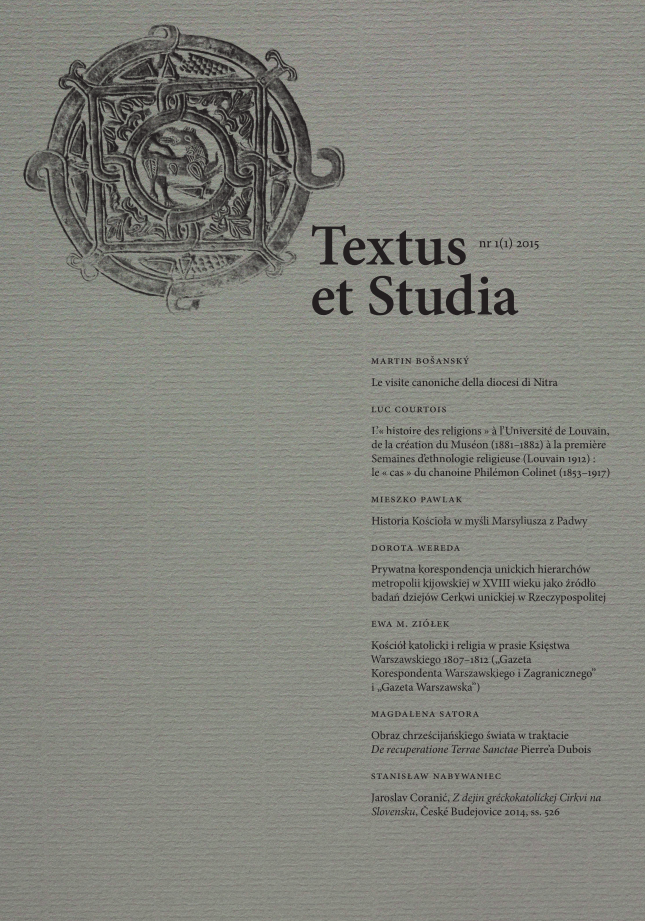Historia Kościoła w myśli Marsyliusza z Padwy
DOI:
https://doi.org/10.15633/tes.01103Słowa kluczowe:
państwo, papiestwo, polityka, Donacja Konstantyna, władza doczesna i duchowaAbstrakt
The History of the Church in the Thought of Marsilius of Padua The article discusses the issue of Church history in the thought of Marsilius of Padua, one of the most original thinkers of the Middle Ages. The author of the article presents the specific vision of the history of Christianity outlined by Marsilius, beginning with his view of the early Church as the community in which the primacy of Roman bishops emerged gradually – not by the will of God, but with a human decision motivated by pragmatic reasons. According to Marsilius, the reign of Constantine the Great marked a turning point in the history of Christianity, since it enabled identification of the Church and the state, as a result of which the communitas fidelium became a perfect community. On the other hand, Constantine supposedly initiated a process of gradual degeneration of the Church through his reckless donation given to Pope Sylvester and his successors. Taking into account the thought Marsilius of Padua in its entirety, the author tries to demonstrate that this vision of the history of Christianity was in fact an instrument of political propaganda, aimed at justifying the full subordination of the Church to the state.
Bibliografia
Marsilius von Padua, Defensor pacis, oprac. R. Scholz, Hannover 1932–1933. Marsyliusz z Padwy, Obrońca pokoju, tłum. W. Seńko, Kęty 2006.
Canning J., The Role of Power in the Political Thought of Marsilius of Padua, „History of Political Thought” 1999, vol. 20, no. 1.
Copleston F., Historia filozofii, t. 3, Od Ockhama do Suáreza, tłum. H. Bednarek, S. Zalewski, Warszawa 2009.
Garnett G., Marsilius of Padua and ‘the Truth of History’, Oxford 2006.
Gewirth A., Marsilius of Padua and Medieval Political Philosophy, New York 1951.
Godthardt F., The Life of Marsilius of Padua [w:] A Companion to Marsilius of Padua, G. Moreno-Riaño, C.J. Nederman (eds.), Leiden 2012. Koch B., Marsilius of Padua on Church and State [w:] A Companion to Marsilius of Padua, G. Moreno-Riaño, C.J. Nederman (eds.), Leiden 2012.
Nederman C.J., Community and Consent. The Secular Political Theory of Marsiglio of Padua’s Defensor Pacis, Lanham 1995.
Skinner Q., The Foundations of Modern Political Thought, vol. 2, The Age of Reformation, Cambridge 1978.
Strauss L., Marsyliusz z Padwy, tłum. P. Graczyk [w:] Historia filozofii politycznej, L. Strauss, J. Cropsey (eds.), Warszawa 2010.
Sweeney M.J., The Sprituality of the Church: Scripture, Salvation, and Sacraments [w:] A Companion to Marsilius of Padua, G. Moreno-Riaño, C.J. Nederman (eds.), Leiden 2012.
Wójtowicz A., Model władzy państwowej Marsyliusza z Padwy, Katowice 1977.
Pobrania
Opublikowane
Numer
Dział
Licencja
Prawa autorskie (c) 2017 Mieszko Pawlak

Praca jest udostępniana na licencji Creative Commons Attribution-NonCommercial-NoDerivatives 3.0 Unported License.
Autorzy publikujący w czasopiśmie udzielają jego wydawcy zgody o następującej treści:
- Autor zachowuje autorskie prawa majątkowe do utworu, a jednocześnie udziela wydawcy czasopisma zgody na jego pierwszą publikację w wersji drukowanej i wersji online na licencji Creative Commons Uznanie autorstwa 4.0 Międzynarodowe oraz zgody na wykonywanie opracowań, w tym przekładów.
- Autor ma możliwość udzielania zgody niewyłącznej na opublikowanie utworu w wersji, która ukazała się w czasopiśmie (np. zamieszczenia go w repozytorium instytucjonalnym lub opublikowania w książce), wraz z informacją o jego pierwszej publikacji w czasopiśmie.
- Autor może umieścić swój utwór online (np. w repozytorium instytucjonalnym lub na swojej stronie internetowej) jeszcze przed zgłoszeniem utworu do czasopisma.

